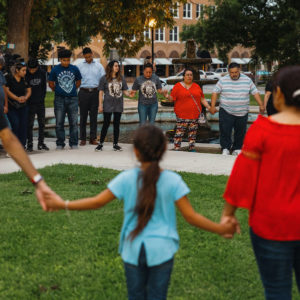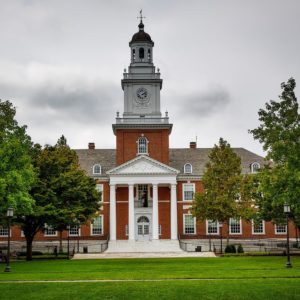The fever was on us—if we can be honest with ourselves—long before the pandemic hit. It’s a self-fueling hatred, more firestorm than virus. Something in our hearts is the propellent. We all know it, and many of us have our scapegoats, the listing of which is tiresome, and which may be summed up thusly: Someone else is to blame for the disunited state of our country, for the state of our hearts. Yes, we are sick, but they did it to us.
It seems a great many people know who is to blame for this present pandemic, too. The trouble is that they can’t agree. The trouble is that who preoccupies so many people at a time like this, as we shelter in place, as the shadow of New York stretches toward our cities, our towns, our homes. There has to be a villain. There has to be. Bad things happen because there are bad, bad people out there, doing evil on purpose.
Aleksandr Solzhenitsyn knew something about evil, having endured the tortures of the gulag and, perhaps worse, the torment of witnessing his countrymen play the roles of informants, collaborators, executioners, cowards. Yet against the impulse to see demons in our midst, he wrote:
“If only it were so simple! If only there were evil people somewhere insidiously committing evil deeds, and it were necessary only to separate them from the rest of us and destroy them. But the line dividing good and evil cuts through the heart of every human being. And who is willing to destroy a piece of his own heart?”
Dig down to the roots of words we’ve trivialized and you’ll find, standing in eternal opposition to one another, devil and symbol. The first, the slanderer, Diabolos, divides man from woman, brother from brother, humanity from God. Opposing this spirit is the ancient symbolon, an item broken in two after people made an agreement, so that each of them might carry a token. The fitting together of those tokens—their rejoining into something whole—signified the legitimacy of their bearers.
The symbol enables fellowship, the devil rends it. And we carry both spirits within ourselves, don’t we? We all of us continually divide or rejoin, shatter or repair. Most of us do both in a single day, every day. Solzhenitsyn again:
“One and the same human being is, at various ages, under various circumstances, a totally different human being. At times he is close to being a devil, at times to sainthood. But his name doesn’t change, and to that name we ascribe the whole lot, good and evil.”
Though we are ourselves splintered, we want to cast others as wholly good or wholly evil. It’s easier to divide them into opposing camps that way. No messy fractions.
We live in a diabolical time.
I’m forever pestering my children to read good books. “Dad,” they say, Pontius Pilate echoing in their voices, “what’s a good book?”
Gone are the homeschool days of Hatchet and Redwall, of Tom Sawyer and The Dark is Rising. We put our children in charter schools, telling ourselves charter serves as a talisman against boredom. Now they read mediocre, Expert Approved books intended to make a point. I envision them gathered round a story in their classroom, living out the scene at the end of Billy Collins’s “Introduction to Poetry:”
But all they want to do is tie the poem to a chair with rope and torture a confession out of it.
They begin beating it with a hose to find out what it really means.
“Dad, what’s a good book?”
I used to have so many intelligent answers. Now, in this diabolical age, they fail me. We rage at one another about what literature is worthy and unworthy almost as viciously as we rage about politics. Many people believe there’s no difference. What you read is your politics.
“Dad, what’s a good book?”
I don’t have an unimpeachable answer, but I believe we’ll perish if we don’t conjure one that works. Because this fever that’s seized us can only be abated with compassion. Against diabolos we can only offer up the symbolon: fragments restored to a fissured but beautiful whole. Good art reveals man not as angel or demon, but as a fractured icon. It reminds us that we all fall short and need a measure of mercy. It reminds us that, in the straightforward words of writer Elmore Leonard: “Every villain has a mother.”
Tony Woodlief lives and writes in North Carolina. His short fiction has appeared in Image, Ruminate, Saint Katherine Review, and Dappled Things, while his essays about parenthood and faith have appeared in The Wall Street Journal, Comment, and The London Times. He runs a website for fathers called Intentional Fathering, and can occasionally be found on Twitter.





